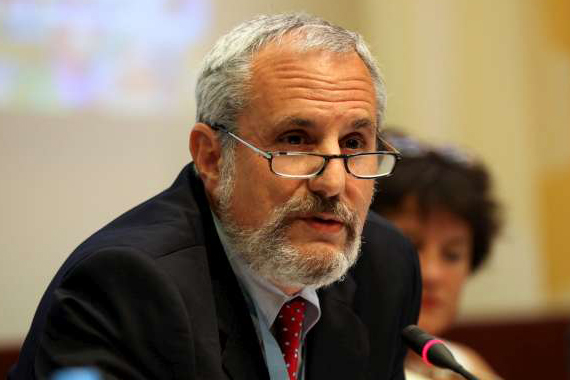Despite the widespread media attention to a global refugee “crisis,” refugee law scholar and practitioner T. Alexander Aleinikoff reimagines an international policy for refugee resettlement and integration as a response to a manageable, if long-neglected, system of displacement and disenfranchisement.
His visit on March 29 to Boston College Law School, co-sponsored by the BC Center for Human Rights and International Justice (CHRIJ) and the Clough Center for the Study of Constitutional Democracy, presented a timely discussion on refugee law in a period of political turmoil surrounding border security and forced migration.
Aleinikoff, the former United Nations Deputy High Commissioner for Refugees, is a Visiting Professor of Law at Columbia Law School. He is also Huo Global Policy Initiative Research Fellow at Columbia’s Global Policy Initiative and a Senior Fellow at the Migration Policy Institute. He was Co-chair of the Immigration Task Force for President Obama’s transition team, and is an American Academy of Arts and Sciences inductee.
The legal scholar’s current work is a continuation of his extensive publication record in the areas of immigration, citizenship, race, and refugee law. During his talk at BC Law, Aleinikoff invited feedback on a work in “transformation,” a forthcoming book exploring the tension between a desire to improve human rights and the rights of forced migrants, and states’ rights to set borders and legal boundaries.
Aleinikoff began his talk by resisting, in the face of mainstream media inundation, the phrase “refugee crisis” in the context of contemporary Europe. He rerouted attention to folks who do not fit the classic definition of refugee—those forced from their homes in places like Somalia, Sudan, and Columbia across international borders and who end up in long-term refugee situations. If forced migration is the first exile refugees face, the “second exile” describes exclusion of the refugee from social welfare and state life, including health and educational provisions, as well as community integration.
Aleinikoff placed the blame for the rise in protracted refugee situations and the second exile on the United Nations High Commissioner for Refugees (UNHCR), which spends nearly $3 billion a year on refugee assistance, yet creates a problematic North/South divide for shouldering responsibility for refugees. He explained that, since the 1990s, the attitude of global North is to provide funding for refugee resettlement in global South, a model that mirrors the politics of the US Southern border in which militarization deters fleeing Central Americans and deflects to South American nations for integration and care. However, though borders in the global South are often more permeable, the human rights of refugees are often not respected and refugees are settled into long-term camps.
This divide, which Aleinikoff characterizes as a “feel-good route to avoid responsibility,” fosters a policy in which the North pays the South to take care of refugees to keep them out of Northern states. Thus, this system creates a “state of dependence” for people in refugee situations, as well as a corresponding model of hegemonic humanitarianism. In response, Aleinikoff calls for a formal structure of burden-sharing that centers on both global responsibility and refugee agency.
Aleinikoff argued that states have the responsibility because they have created this host-and-donor state system. Imagining the new system of global responsibility requires that inclusion and cooperation are prioritized to pursue five principles of protection: rescue and safety, in-placement and integration into state life, an orientation toward solutions, refugee right to mobility, and voice through refugee political representation. This system almost must focus on renouncing the “liberal consensus” surrounding refugee law that denies refugee mobility, has a narrow view of global development, and offers little in the way of solutions.
Aleinikoff urged that we cannot abide a “humanitarianism” that accepts the “second exile” of people in refugee situations, one that calls the privileged to “donate dollars for more tents, rather than organize to support refugee rights.” Rather, in the same way his work reimagines refugee law, we must demand a formal system of state responsibility that respects refugee agency.
In conclusion, Aleinikoff issued a call to action that extends even beyond global responsibility, affirming that “we all have a role in fixing the system that has left so many poorly served for so long.”


